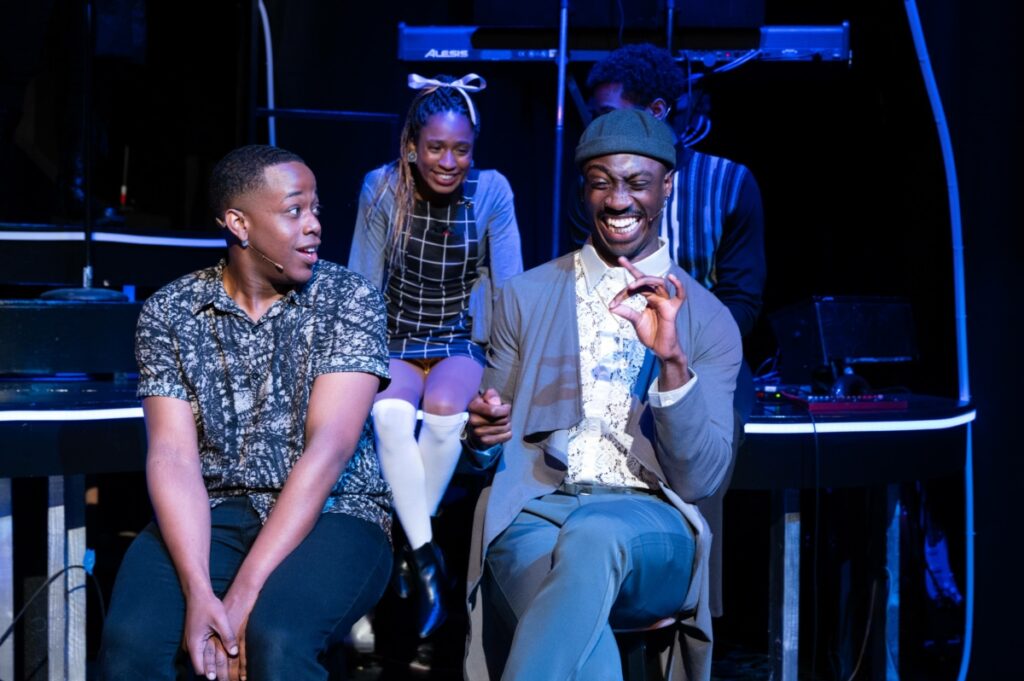
Tear down this wall.
You can feel strange echoes of that Reagan refrain these days.
Just as the restrictions that have held much of our lives at bay through the pandemic are dismantled, a brutal new Iron Curtain threatens to descend on Eastern Europe.
Passing Strange, a show that travels from Southern California to West Berlin, was originally mounted at the Berkeley Rep in 2006. Its now playing in an invigorating new production at Berkeley’s Shotgun Players. Long delayed, it ironically arrives with impeccable timing, its form and content speaking—and squalling—to our current moment.
There’s no curtain or fourth wall here. And after so long sitting on the spectatator side of boxy electronic prosceniums, it’s just what the doctor ordered. The exchange of energy between performers and audience that’s always part of live theater’s secret sauce gets its communal umami further amped up in a staging that’s more like a rock club performance than a typical Broadway musical (Stew, the mononymned lyricist and co-composer—with Heidi Rodewald, won a 2008 Tony for the show’s autobiographical book).
The ingenious set, by scenic and lighting designers Romello Huins and Stephanie Johnson, uses just a squiggle of blue neon to draw the thinnest of lines between stage and auditorium.
Instead of a pit orchestra, there’s a deft four-man band on stage from the get-go: music director Daniel Alley is on keyboards, Michael ‘Tiny’ Lindsey plays bass, Vincent de Jesus drums, and riveting guitarist Bennett Hull, who seems slightly abashed in the spotlight, shreds to compensate for his shyness.
Albert Hodge, in the role of Narrator (played at Berkeley and on Broadway by Stew himself) does double duty, functioning both as lead singer for the band and as a bridge between their in-the-moment musical performance and the past-tense story played out by six additional actors, who perform alongside the musicians on risers and below them, on the multi-tiered space’s bottom-most level.
As envisioned by Stew with original director Annie Dorsen and thrillingly refreshed by Shotgun director William Hodgson, this staging radically restructures the traditional relationship of instrumentalists to actor-singers in musical theater. The walloping blend of rock, soul, punk and new wave sounds in this show are at least as expressive as anything the actors say or sing in words.
“If you’re ever not sure what we’re about,” the Narrator sings in the opening number. “Just ask the song. Just ask the song. Just ask the song.” The answer, Passing Strange argues, will not be literal—language and lyrics can only tell us so much. Articulation and definition are insufficient. Emotion is in constant motion: Music, played live, delivers it in a way that no other medium can.
Passing Strange is built around a familiar coming-of-age plot line (Misunderstood, middle-class American adolescent goes on a journey to make art and find meaning) with a few refreshing tweaks (The kid is a nerdy black rock-star wannabe; he starts out in California and heads east to Amsterdam and Germany). The narrative is delivered loosely, in set pieces, more concept album than musical comedy: Think Tommy or The Wall in concert, before they were sapped of their strength by cinematic literalism.
There are motivational gaps that would feel egregious in another sort of show, but work just fine in this format. The relationships between the protagonist Youth (Devin Cunningham, a bit mismatched with the far-more-intense Hodge, as his retrospective adult self) and his Baptist church-going mother (played with magnetic fragility by Rolanda D. Bell) is just roughly sketched by the script script. Likewise his entwinement his love interests (Chanel Tilghman and Angel Adedokun, both terrific in multiple roles). But the music colors everything in, the band’s fully engaged performance—definitely not accompaniment—delivers intense feeling from moment to moment. It helps the action feel organic and impulsive rather than composed.

The entire second act of this singular work is set in the squats of West Berlin in the mid-1980s. Huddled masses of rabble-rousing, multi-racial young people deploy an arsenal of rock music, ragged performance art and Molotov cocktails to express rightful dissatisfaction with the state of the world alongside their yawps of inchoate adolescent identity-seeking.
Amidst this setting of global unrest, Youth tries to make sense of himself and his place in the world. He can never fully succeed. But in its riffing, ripping present-day finale, Passing Strange assures us that he also never stops trying. Those yawps are the music of perpetual motion, of the insatiable yearning to become one’s self and be free.
Sometimes there are no words.
